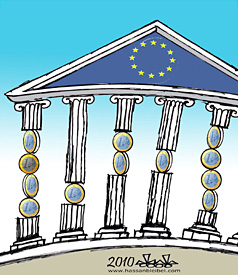The great and good of Europe have been obsessing over a revived and strengthened stability pact for the euro — that is, tougher constraints on budget deficits.
Following months of heated debate over whether countries in the euro zone that fail to reduce their debt levels adequately should be punished, German Chancellor Angela Merkel and French President Nicolas Sarkozy finally reached a deal on putting in place automatic sanctions, in order to avert future Greek-style debt crises.
Their agreement basically empowers certain politicians to block such sanctions.
Wolfgang Munchau, a columnist at the Financial Times, marvels at Europe’s latest obsession in an Oct. 24 commentary piece. “The real irony is that the pact, in whatever form, is not even relevant to the euro zone’s future,” he writes. “This may be a shocking statement. But look at the evidence. Contrary to popular narrative, fiscal profligacy played only a minor role in the euro zone’s sovereign debt crisis. Successive Greek governments cheated, but on my information, this occurred with at least partial knowledge of the senior European officials involved in the process. They chose not to apply the pact for political reasons.”
Do you like this? Click here to get Truthout stories sent to your inbox every day – free.
“As for Spain and Ireland, they did not breach the rules ever, and would thus never have been subject to sanctions, automatic or otherwise.”
What Mr. Munchau doesn’t say, but I suspect he understands, is that this is in large part a case of the boy with a hammer, for whom everything is a nail.
Bankers and economists love, just love, being fiscal scolds.
Deficits are something they understand, plus denouncing deficits makes these experts sound moral and responsible. According to this narrative, everyone was reckless, and there is only one fix.
So rather than considering the complexities of our current economic problems — such as the need to rein in shadow banking — many of these people would really much rather lecture governments on the evils of red ink.
Earlier this year, it was very obvious from where I sit that these Very Serious People were in some ways overjoyed at the Greek debt crisis.
At last, here was their kind of issue. Here was a debt-saddled nation forced to make deep budget cuts in its struggle to stop interest rates from rising. And after the furor over Greece had died down, they wanted to Hellenize everything in sight.
The failure of interest rates in the United States to spike has caused much private disappointment for such people.
So Europeans are obsessing over a stability pact? Well, it’s a whole lot more pleasant than figuring out how to make the euro work.
Truthout has licensed this content. It may not be reproduced by any other source and is not covered by our Creative Commons license.
Paul Krugman joined The New York Times in 1999 as a columnist on the Op-Ed page and continues as a professor of economics and international affairs at Princeton University. He was awarded the Nobel in economic science in 2008.
Mr Krugman is the author or editor of 20 books and more than 200 papers in professional journals and edited volumes, including “The Return of Depression Economics” (2008) and “The Conscience of a Liberal” (2007).
Copyright 2010 The New York Times Company.
We’re not backing down in the face of Trump’s threats.
As Donald Trump is inaugurated a second time, independent media organizations are faced with urgent mandates: Tell the truth more loudly than ever before. Do that work even as our standard modes of distribution (such as social media platforms) are being manipulated and curtailed by forces of fascist repression and ruthless capitalism. Do that work even as journalism and journalists face targeted attacks, including from the government itself. And do that work in community, never forgetting that we’re not shouting into a faceless void – we’re reaching out to real people amid a life-threatening political climate.
Our task is formidable, and it requires us to ground ourselves in our principles, remind ourselves of our utility, dig in and commit.
As a dizzying number of corporate news organizations – either through need or greed – rush to implement new ways to further monetize their content, and others acquiesce to Trump’s wishes, now is a time for movement media-makers to double down on community-first models.
At Truthout, we are reaffirming our commitments on this front: We won’t run ads or have a paywall because we believe that everyone should have access to information, and that access should exist without barriers and free of distractions from craven corporate interests. We recognize the implications for democracy when information-seekers click a link only to find the article trapped behind a paywall or buried on a page with dozens of invasive ads. The laws of capitalism dictate an unending increase in monetization, and much of the media simply follows those laws. Truthout and many of our peers are dedicating ourselves to following other paths – a commitment which feels vital in a moment when corporations are evermore overtly embedded in government.
Over 80 percent of Truthout‘s funding comes from small individual donations from our community of readers, and the remaining 20 percent comes from a handful of social justice-oriented foundations. Over a third of our total budget is supported by recurring monthly donors, many of whom give because they want to help us keep Truthout barrier-free for everyone.
You can help by giving today. Whether you can make a small monthly donation or a larger gift, Truthout only works with your support.
